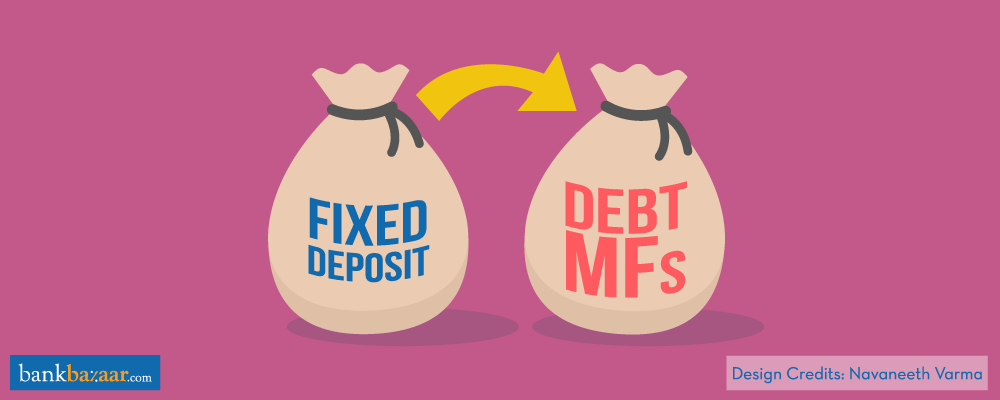The debt Mutual Fund, although risky, has the potential to give you a better return in the long term along with tax benefits. Here are a few points that you should keep in mind while switching your investment from FDs to debt fund.

Interest rates on Fixed Deposits (FDs) have fallen from 9% p.a. mark in 2013 to around 6.5% mark in the current market. This fall in the rates could be very painful, especially if you fall in the 30% income tax bracket. That’s because the effective interest on FDs will fall to only 4.55% p.a. after deductions.
Retail inflation was close to 3.36% level in the month of August 2017. A little spike in inflation would mean negative rate of return in FDs. It could be a tricky situation for investors to continue with a low-rate FD. Therefore, it makes sense to explore and switch their investment to other avenues such as a debt Mutual Fund.
The debt Mutual Fund carries a higher risk in comparison to the FDs, but at the same time, it has the potential to give you a better return in the long term.
Here are a few things you must keep in mind while switching investment from FDs to debt funds.
Decide The Investment Tenure
While assessing the option to switch your investment from a Fixed Deposit to a Mutual Fund, you should consider a debt fund.
Redemption of debt fund before a 3-year period is considered as short-term. Tax on such short-term capital gain is taxed at the respective income tax slab rate of the individual. Redemption after 3 years is termed as long-term, and long-term capital gain is taxed at a 20% rate (with indexation benefit). If you invest for more than 3 years, debt fund proves to be more tax efficient than FD. It considers the inflation rate under indexation calculation that finally results in a lower tax liability. For a short duration, i.e. under 3 years also, debt fund offers a good return.
You can decide the duration of the investment as per your financial planning. Splitting your investments into two or three parts as per short- and long-term objectives is a good idea. FD doesn’t allow you partial redemption. However, a debt fund allows partial redemption, and accordingly, the tax is imposed on the redeemed units. So, you can also keep the investment in a single fund and redeem amount as and when required as per your plan.
However, always check the exit load to the debt fund as most funds levy an exit load if the redemption is made before a certain period.
Type Of Debt Fund You Should Select
Selection of the right debt fund is important when you look to switch from an FD investment. The type of debt fund depends on whether you are looking to invest for less than 3 years or more.
You can also opt for a Systematic Withdrawal Plan (SWP) option once the correct fund is selected and you have accumulated some income from such investment. For example, if you have invested for less than 3 years (say 2 years), then you should wait for 6 months to get some income accumulated. After assessing the return, you can schedule the SWP. If your fund returns at 9% p.a. rate, you should withdraw around 5%-6% amount p.a. so that your fund still grows after tax and the SWP.
For short-term investment, you can explore opportunities in short-term debt funds or ultra short-term debt funds, whereas, for long-term investment, you can explore opportunities in dynamic bond funds and long-term debt funds.
How To Invest In Debt Mutual Funds
Just like how you invest in a recurring Fixed Deposit at regular intervals, you have the option to invest in debt funds through the SIP mode. If you want to shift complete FD amount to debt fund, then you can opt for a lumpsum investment. While exiting FD investment, you must check the penalty on early exit or the loss in interest while you switch to a debt fund. This will help you figure out the overall impact on the income.
Whatever income you make from a debt fund is not taxed until you decide to redeem it. However, in case of a FD, you need to pay tax on the accrued interest every year even if such interest continues to remain invested with the bank. If you can take a slightly higher risk in comparison to FD, a debt fund could give you more flexibility in terms of liquidity and tax benefits. It will also allow a higher return in short- and long-term period.
BankBazaar is a leading online marketplace in India that helps consumers compare and apply for Credit Card, Personal Loan, Home Loan, Car Loan and insurance.